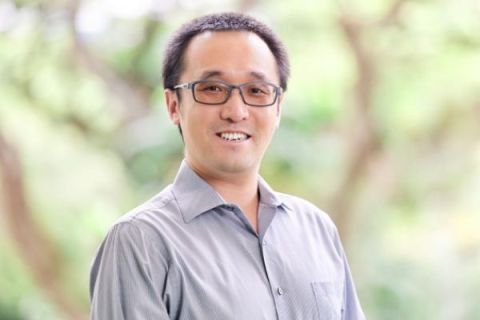
By Christie Loh
SMU Office of Research – Dads, if you are willing to take up the dishwashing sponge, toilet brush or spatula, there is a good chance you will be doing some national service: Boosting both the country’s low birth rate and women’s contribution to the economy.
Sounds like a stretch? Not really.
According to multi-year data analysed by Ohjae Gowen, Assistant Professor of Sociology at Singapore Management University (SMU), new mothers in the United States are less likely to combine full-time employment and having a second child when fathers participate less in housework.
That is the subject of a paper that Professor Gowen plans to submit to an academic journal before the year’s end, and which he had worked on as part of his PhD dissertation at Harvard University in Boston, US.
For the 34-year-old sociologist, theory and reality have melded serendipitously: he welcomed his firstborn in August, on the very morning that he was scheduled to defend his dissertation, which delves into fatherhood, employment and gender inequality. This has delayed his move to Singapore for his new job at SMU, as he and his wife decided to remain in Boston for their daughter’s initial months.
Come end-November, they will set up home in Singapore. In the meantime in Boston, Professor Gowen is discovering what it means to live with a newborn. He spends four to six hours a day on household chores, from washing milk bottles to taking out the trash. This includes childcaring activities such as feeding and rocking the baby to sleep.
“I’m trying my best to be as equitable as possible in terms of the household division of labour,” Professor Gowen said with a smile, during a Zoom chat with the Office of Research. “Now I realise that it’s not just about an instrument to help that the husbands give, it’s also an emotional and kind of social support that the husbands can provide.”
He added: “My research is impacting my personal life, but my personal life is also kind of impacting my research in the sense that it gives many insights that I had probably missed before having a child.”
Analysis insights
One insight, for example, is the difficulty of distinguishing between housework and baby-care in real life. Yet in the US Panel Study of Income Dynamics (PSID), which forms the foundation for Professor Gowen’s research, there was no such differentiation in the questionnaire for the respondents, who were asked how much time they spent on “housework” weekly before and after the birth of the first child. "This remains a limitation of the PSID, as is the case with many conventional surveys. We thus need more data collection efforts here,” he said.
The PSID was launched in 1968 by polling around 5,000 families and subsequently following up on them and their offspring over the years. It provides detailed information on employment and fertility history to measure work and motherhood outcomes among various demographics and age groups in the US.
The survey showed respondents reporting an increase in housework hours after the baby was born; however, while the mother said she was spending more time on housework post-birth, the father reported no change in his housework load.
“The figures provide compelling evidence of the substantial increase in within-couple gender inequality in housework time associated with the transition to parenthood,” wrote Professor Gowen in his draft paper titled “Career, Children, or Neither? Fathers’ Housework and Mothers’ Work-Family Arrangements Following First Birth in the United States”.
He analysed the PSID data from 1976 to 2021, using bivariate probit regression models. Data-crunching indicated that “fathers’ greater housework support is positively associated with the likelihood that mothers both maintain full-time work and have a second child,” Professor Gowen said in his paper. “This is primarily because, with support from the husband, a mother doesn’t have to compromise her full-time employment while the couple decides to have a second child,” he explained.
What of the Singapore context, where families can hire live-in domestic helpers, who vastly relieve both parents of their housework and even childcare demands?
Professor Gowen noted that Singapore presents an intriguing case, as its fertility rate remains low despite the ease of hiring domestic helpers. This raises questions, he said, about whether outsourcing housework and husbands’ housework support serve the same role, and whether the presence of domestic helpers primarily facilitates Singaporean mothers’ full-time employment rather than their additional childbearing.
Singapore’s Resident Total Fertility Rate has been slipping over the past decades since 1980, hitting an unprecedented 0.97 for 2023. On the other hand, the women have increasingly opted for salaried work during those years. The employment rate for females aged 25 to 64 stood at a high 76.6 percent in 2023, according to statistics released by the Ministry of Manpower.
With more publicly available data, Professor Gowen said, he hopes to examine the trends in Singapore. More broadly, he is planning to investigate the causes and consequences of low fertility rates in the Asian context, starting with his home country, South Korea.
Impact on policymaking
What studies like Professor Gowen’s show policymakers is not a simplistic signpost that getting dads to do more household chores would help solve the fertility crisis in many post-industrialised nations. In actuality, Professor Gowen’s work bolsters the rising consensus that when fathers become more involved in family life, via policies such as longer paternity leave, families, especially those with dual-income couples, are encouraged to grow.
“Men’s household labour at the individual level is not an independent factor from other social systems such as parental leave or work-life support in the workplace,” he said. “I conceptualised men’s household labour as one dominant micro level mechanism that is related to the broader social environments that reflect gender equity in the labour market and at home.”
He explained in his paper that investments in work-family policies by employers and the state, alongside the organisation of work conducive to family life, can offer crucial resources for mothers pursuing full-time employment and additional childbearing.
These dynamics will be playing out in Professor Gowen’s life in the months ahead. As he relocates to Singapore, his wife will have decisions to make regarding her legal career and childcare arrangements. And will they choose to have a second baby later? That is not a question the couple has talked about. Yet. After all, there is enough on their plate at the moment.
“Balancing work and family myself is very intense these days,” said the smiling, soft-spoken Professor Gowen.
Back to Research@SMU November 2024 Issue
See More News
Want to see more of SMU Research?
Sign up for Research@SMU e-newslettter to know more about our research and research-related events!
If you would like to remove yourself from all our mailing list, please visit https://eservices.smu.edu.sg/internet/DNC/Default.aspx

